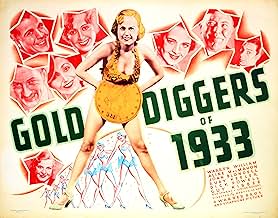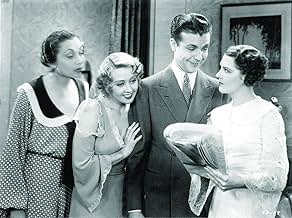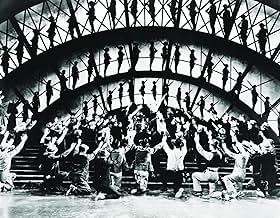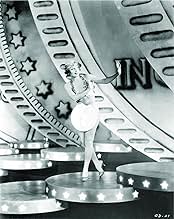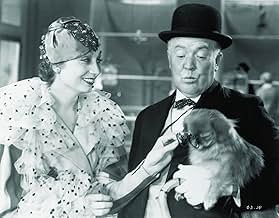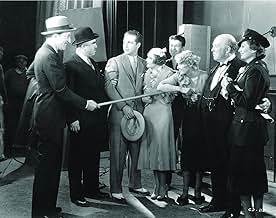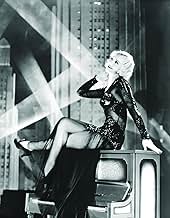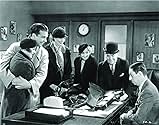IMDb RATING
7.7/10
9.8K
YOUR RATING
A wealthy composer rescues unemployed Broadway performers with a new play, but insists on remaining anonymous.A wealthy composer rescues unemployed Broadway performers with a new play, but insists on remaining anonymous.A wealthy composer rescues unemployed Broadway performers with a new play, but insists on remaining anonymous.
- Nominated for 1 Oscar
- 4 wins & 1 nomination total
Robert Agnew
- Dance Director
- (uncredited)
Loretta Andrews
- Gold Digger
- (uncredited)
Monica Bannister
- Gold Digger
- (uncredited)
Bonnie Bannon
- Gold Digger
- (uncredited)
Joan Barclay
- Gold Digger
- (uncredited)
Anita Barnes
- Gold Digger
- (uncredited)
Billy Barty
- Baby in 'Pettin' in the Park' Number
- (uncredited)
Busby Berkeley
- Call Boy
- (uncredited)
Bonnie Blackwood
- Chorus girl
- (uncredited)
Eric Blore
- Clubman
- (uncredited)
7.79.7K
1
2
3
4
5
6
7
8
9
10
Featured reviews
Interesting Depression musical starring some of the usual suspects
With the success of "42nd Street," Warner Brothers wasted no time adding Busby Berkeley musical numbers to "Gold Diggers of 1933."
Starring Dick Powell and Ruby Keeler, this musical also has some of the same Depression darkness that permeated "42nd Street." "It's the Depression, dearie," Ginger Rogers says as the show she and her fellow chorines are laboring in closes in rehearsal due to lack of funding.
However, Brad (Powell), a composer in a nearby apartment who's sweet on Polly (Keeler), offers to give Ned Sparks the money he needs to produce his new show. His only condition is that Polly be featured.
Everyone wonders where he got the money, and a news item plus the fact that he refuses to appear in the show make the girls suspicious that he's a bank robber. In fact, he's the scion of a wealthy man (Warren William), who soon appears on the scene with his attorney (Guy Kibbee) when Brad steps in for the lumbago-ridden juvenile lead.
Polly's roommates Trixie and Carol (Joan Blondell and Aline MacMahon) go to work on the two immediately.
Though the film has some fantastic numbers - "We're in the Money," "The Shadow Waltz," "Pettin' in the Park," and great Busby Berkeley choreography, the middle section has no music and drags on as the gals meet the men, get them to pay for expensive hats, etc. This is probably because the film was completed when the musical numbers were added.
But the final number is worth the whole film. "Remember Your Forgotten Man" is a tribute to the World War I soldiers now out of work in the Depression, and not only are the production effects and choreography fantastic, but the singing as well, particularly the solo work by Etta Morton. Blondell, who from the sound of it in Dames was completely tone deaf, is beautifully dubbed here.
Ginger Rogers shines in a supporting role especially with her pig Latin lyrics to "We're in the Money" which were added after she was heard fooling around in a rehearsal. Powell is in gorgeous voice in all the numbers, but "I've Got to Sing a Torch Song" is a high point.
It's easy to watch the dancing, the beautiful women in their costumes, and listen to the singing and forget what in fact was going on in the '30s - after all, that's why these films were made.
But the "Forgotten Man" number serves as a reminder then and today that for the people sitting in the theaters, their troubles were right outside the door.
Starring Dick Powell and Ruby Keeler, this musical also has some of the same Depression darkness that permeated "42nd Street." "It's the Depression, dearie," Ginger Rogers says as the show she and her fellow chorines are laboring in closes in rehearsal due to lack of funding.
However, Brad (Powell), a composer in a nearby apartment who's sweet on Polly (Keeler), offers to give Ned Sparks the money he needs to produce his new show. His only condition is that Polly be featured.
Everyone wonders where he got the money, and a news item plus the fact that he refuses to appear in the show make the girls suspicious that he's a bank robber. In fact, he's the scion of a wealthy man (Warren William), who soon appears on the scene with his attorney (Guy Kibbee) when Brad steps in for the lumbago-ridden juvenile lead.
Polly's roommates Trixie and Carol (Joan Blondell and Aline MacMahon) go to work on the two immediately.
Though the film has some fantastic numbers - "We're in the Money," "The Shadow Waltz," "Pettin' in the Park," and great Busby Berkeley choreography, the middle section has no music and drags on as the gals meet the men, get them to pay for expensive hats, etc. This is probably because the film was completed when the musical numbers were added.
But the final number is worth the whole film. "Remember Your Forgotten Man" is a tribute to the World War I soldiers now out of work in the Depression, and not only are the production effects and choreography fantastic, but the singing as well, particularly the solo work by Etta Morton. Blondell, who from the sound of it in Dames was completely tone deaf, is beautifully dubbed here.
Ginger Rogers shines in a supporting role especially with her pig Latin lyrics to "We're in the Money" which were added after she was heard fooling around in a rehearsal. Powell is in gorgeous voice in all the numbers, but "I've Got to Sing a Torch Song" is a high point.
It's easy to watch the dancing, the beautiful women in their costumes, and listen to the singing and forget what in fact was going on in the '30s - after all, that's why these films were made.
But the "Forgotten Man" number serves as a reminder then and today that for the people sitting in the theaters, their troubles were right outside the door.
Forgotten Musical Gem
Mervyn LeRoy directs this irresistible and touching depression-era musical. Busby Berkeley's choreography is as breath-taking as ever, as are the bevy of beautiful women in the elaborate productions. Many great musical numbers highlight this film including "We're in the Money" in which a then unknown, Ginger Rogers sings in Pig Latin. A host of other oddities can be found as always when Mr. Berkeley is involved. Ruby Keeler and Dick Powell are sensational as dancing and singing lovebirds and all works out well in the end. The show does close on a noticeably strange note with the very powerful protest number regarding the depression called "Forgotten Man" masterfully delivered by bombshell, Joan Blondell. A truly original and memorable musical.
Pre-code masterpiece
This masterpiece from 1933 is one of the best examples I've seen of early Hollywood exploitation, although by today's standards if you didn't already know it was controversial at the time you probably wouldn't notice. With the introduction of the talkies in the late 1920's, Hollywood seemed unable to control various movies using subtle innuendos, and actresses displaying a bit more skin than they should until the Hays Code came into full force in 1934, which enforced the boundaries as to what was deemed acceptable on screen. Gangsters profited from crime, women displayed their legs, and in the case of Gold Diggers Of 1933, women used their sexuality to conquer men and gain what they wanted.
Set during the Depression, it follows a quartet of stage dancers after their show is stopped due to the creative director failing to pay the bills. Things look on the up when the girls are asked to return for a brand new show, which would tackle the effects of the Depression on the common man and the state of the country. The enthusiastic director Barney (Ned Sparks) overhears the girls' neighbour Brad (Dick Powell) crooning a tune playing his piano, and invites him to play more tunes and eventually write the score for the upcoming musical. Barney also needs a lot of money to fund, something that Brad is happy to pay in case, much to the girls' suspicion.
It comes across as a film with two halves - the first focusing on the development of the musical, the relationship between Brad and dancer Polly (Ruby Keeler), and the confusion surrounding the shady Brad's situation. The second seeing fellow dancers Carol (Joan Blondell) and Trixie's (Aline MacMahon) attempts to squeeze as much cash as possible out of Barney's upper-class brother Lawrence (a brilliant Warren William) and bumbling Peabody (Guy Kibbee). The first is a masterclass of beautiful stage numbers, fantastic songs, and good old-fashioned escapism. The second is where the film hits full stride, providing laugh out loud situations and some verbal comedy that wouldn't look out place today, as the girls flirt with and tease the old men as we cheer them on. It's the kind of thing that Sex And The City wishes it could pull off when it isn't being so materialistic and soulless.
When you think it's over it pulls off one last masterstroke in the highly effective 'Remember My Forgotten Man' musical number, as Joan Blondell sings about how her man fought for her country and now begs for food and resorts to picking up discarded cigarette butts, as bloody soldiers march through the street. It's a beautiful moment and really sums up the era. It offers an insight into the whole Pre-Code Hollywood movement, where people would go to the cinema to escape their everyday struggles to see an actress like Blondell revealing a bit more leg than she should, or a Pre-Code veteran such as Warren William sneer his way through some juicy lines and villainous roles. It gave the general public that little something extra to get excited about.
This is a film that has everything, and if you can track it down I would urge you to see it. It's a fascinating time capsule, and even has a very early role for Ginger Rogers as the flirty Fay. It has also been entered into the National Film Registry for preservation by the Library of Congress. A must-see.
www.the-wrath-of-blog.blogspot.com
Set during the Depression, it follows a quartet of stage dancers after their show is stopped due to the creative director failing to pay the bills. Things look on the up when the girls are asked to return for a brand new show, which would tackle the effects of the Depression on the common man and the state of the country. The enthusiastic director Barney (Ned Sparks) overhears the girls' neighbour Brad (Dick Powell) crooning a tune playing his piano, and invites him to play more tunes and eventually write the score for the upcoming musical. Barney also needs a lot of money to fund, something that Brad is happy to pay in case, much to the girls' suspicion.
It comes across as a film with two halves - the first focusing on the development of the musical, the relationship between Brad and dancer Polly (Ruby Keeler), and the confusion surrounding the shady Brad's situation. The second seeing fellow dancers Carol (Joan Blondell) and Trixie's (Aline MacMahon) attempts to squeeze as much cash as possible out of Barney's upper-class brother Lawrence (a brilliant Warren William) and bumbling Peabody (Guy Kibbee). The first is a masterclass of beautiful stage numbers, fantastic songs, and good old-fashioned escapism. The second is where the film hits full stride, providing laugh out loud situations and some verbal comedy that wouldn't look out place today, as the girls flirt with and tease the old men as we cheer them on. It's the kind of thing that Sex And The City wishes it could pull off when it isn't being so materialistic and soulless.
When you think it's over it pulls off one last masterstroke in the highly effective 'Remember My Forgotten Man' musical number, as Joan Blondell sings about how her man fought for her country and now begs for food and resorts to picking up discarded cigarette butts, as bloody soldiers march through the street. It's a beautiful moment and really sums up the era. It offers an insight into the whole Pre-Code Hollywood movement, where people would go to the cinema to escape their everyday struggles to see an actress like Blondell revealing a bit more leg than she should, or a Pre-Code veteran such as Warren William sneer his way through some juicy lines and villainous roles. It gave the general public that little something extra to get excited about.
This is a film that has everything, and if you can track it down I would urge you to see it. It's a fascinating time capsule, and even has a very early role for Ginger Rogers as the flirty Fay. It has also been entered into the National Film Registry for preservation by the Library of Congress. A must-see.
www.the-wrath-of-blog.blogspot.com
10jotix100
Marvyn Leroy and Busby Berkeley, what a combination!
"Golddiggers of 1933" is a fun movie to watch because all the right elements that went into the making of this motion picture. Mervyn Leroy was truly inspired, and his direction clearly shows he was in total command. The contribution made by the incomparable Busby Berkeley is one of the best things in the film. His choreography for the big production numbers is one of the most impressive thing he did for the movies.
The film is a sweet story about young hopefuls in New York trying to make it in the musical theater. Thus, we find the impoverished room mates, Carol, Trixie and Polly, who are so poor they have to steal their neighbor's milk! These young women are at the end of their rope when Barney, the Broadway impresario comes by to tell them about the new show he is working on. The only trouble, he has no money for it.
How naive and wonderful those movies that came during the great depression were! Everything was possible, in spite of what was happening in the country at the time. In fact, this film, as well as others of that era, served as an excuse for people that were facing a hard time making ends meet for escaping it all when watching a movie like this one.
The cast is excellent. Warren William, Joan Blondell, Aline McMahon, Dick Powell, Ruby Keeler, Ned Sparks, Ginger Rogers, and Guy Kibbee giving performances that endeared them to the American public of the time.
The production number of "Shadow Waltz" has to be one of the best ones in this musical genre ever produced. The number is an amazing one and a tribute to the man who staged it, Busby Berkley. It also help the chorus girls were dressed by Orry-Kelly and the music was by Harry Warren and Al Dubin.
"Golddiggers of 1933" is one of the best movies to come out of the Hollywood of those years.
The film is a sweet story about young hopefuls in New York trying to make it in the musical theater. Thus, we find the impoverished room mates, Carol, Trixie and Polly, who are so poor they have to steal their neighbor's milk! These young women are at the end of their rope when Barney, the Broadway impresario comes by to tell them about the new show he is working on. The only trouble, he has no money for it.
How naive and wonderful those movies that came during the great depression were! Everything was possible, in spite of what was happening in the country at the time. In fact, this film, as well as others of that era, served as an excuse for people that were facing a hard time making ends meet for escaping it all when watching a movie like this one.
The cast is excellent. Warren William, Joan Blondell, Aline McMahon, Dick Powell, Ruby Keeler, Ned Sparks, Ginger Rogers, and Guy Kibbee giving performances that endeared them to the American public of the time.
The production number of "Shadow Waltz" has to be one of the best ones in this musical genre ever produced. The number is an amazing one and a tribute to the man who staged it, Busby Berkley. It also help the chorus girls were dressed by Orry-Kelly and the music was by Harry Warren and Al Dubin.
"Golddiggers of 1933" is one of the best movies to come out of the Hollywood of those years.
Superb--one of the 3 best 30s musicals....
with 42nd Street and Footlight Parade... Snappy, risqué, funny, great cast, great music. What more could you ask for? Joan Blondell, Aline McMahon, and Ruby Keeler are the gold diggers. Warren William, Dick Powell, and Guy Kibbee are their targets. Ginger Rogers is swell singing "We're in the Money" in Pig Latin. Ned Sparks, Sterling Holloway, Charles Lane, and Billy Barty are good. Great musical numbers including the opening "We're in the Money," the terrific finale "Forgotten Man" with Blondell and Etta Moten (singing in the window); "Petting in the Park" and "In a Shadow"---Powell and Keeler.... all classics. Fun all the way......
Look for Hobart Cavanaugh, Grace Hayle, Busby Berkley, Clarence Nordstrom, and one of the roller skating cops sure looks like Jack Carson.
Aline McMahon steals the show, and what a show it is!
Look for Hobart Cavanaugh, Grace Hayle, Busby Berkley, Clarence Nordstrom, and one of the roller skating cops sure looks like Jack Carson.
Aline McMahon steals the show, and what a show it is!
Did you know
- TriviaDuring rehearsals of "We're in the Money", Ginger Rogers began goofing off and singing in pig Latin. Studio executive Darryl F. Zanuck overheard her, and suggested she do it for real in the movie.
- GoofsWhen Brad plays piano for Mr. Hopkins, his fingers don't match the sound of the piano.
- Quotes
Trixie Lorraine: "Fanny" is Faneul H. Peabody, just the kind of man I've been looking for, lots of money and no resistance.
- ConnectionsEdited into Busby Berkeley and the Gold Diggers (1969)
- SoundtracksThe Gold Diggers' Song (We're in the Money)
(uncredited)
Music by Harry Warren
Lyrics by Al Dubin
Played during the opening credits and often in the score
Performed by Ginger Rogers (in English and Pig-Latin) and chorus
Played also as dance music by a band
- How long is Gold Diggers of 1933?Powered by Alexa
Details
- Release date
- Country of origin
- Official site
- Language
- Also known as
- Las insaciables
- Filming locations
- Production company
- See more company credits at IMDbPro
Box office
- Budget
- $433,000 (estimated)
- Gross worldwide
- $105
- Runtime
- 1h 37m(97 min)
- Color
- Sound mix
- Aspect ratio
- 1.33 : 1
Contribute to this page
Suggest an edit or add missing content


